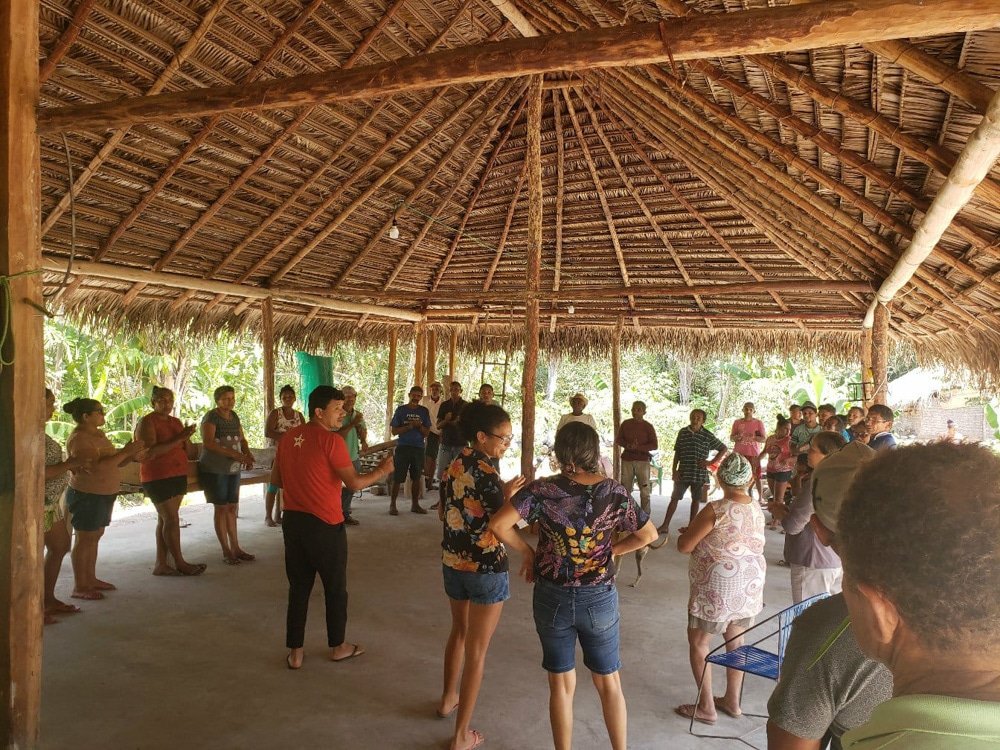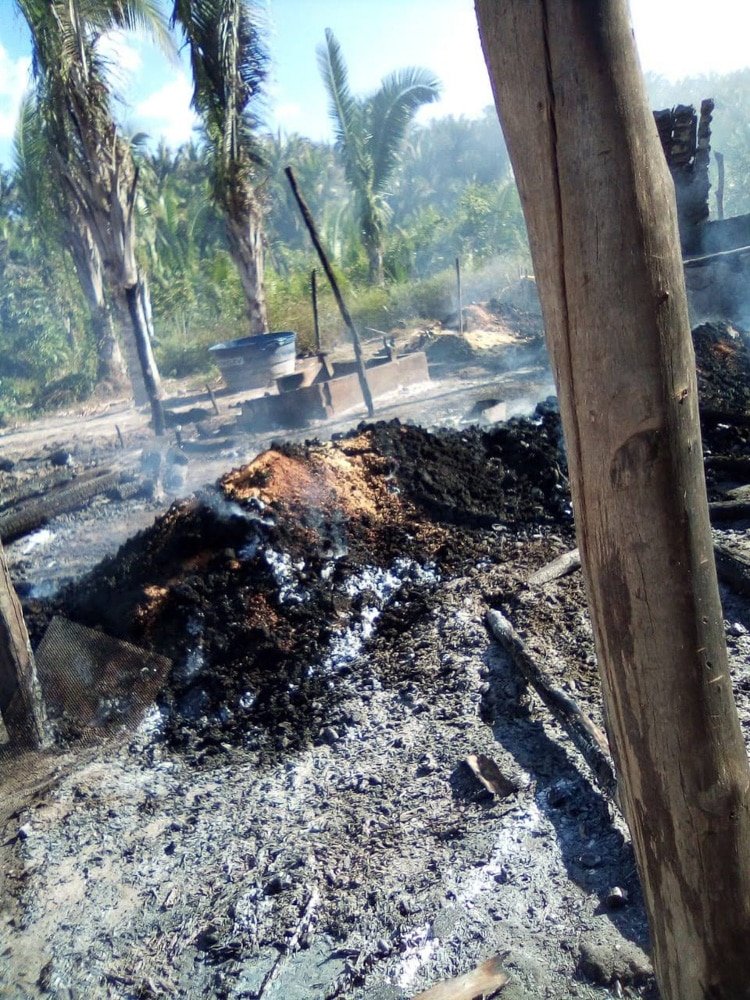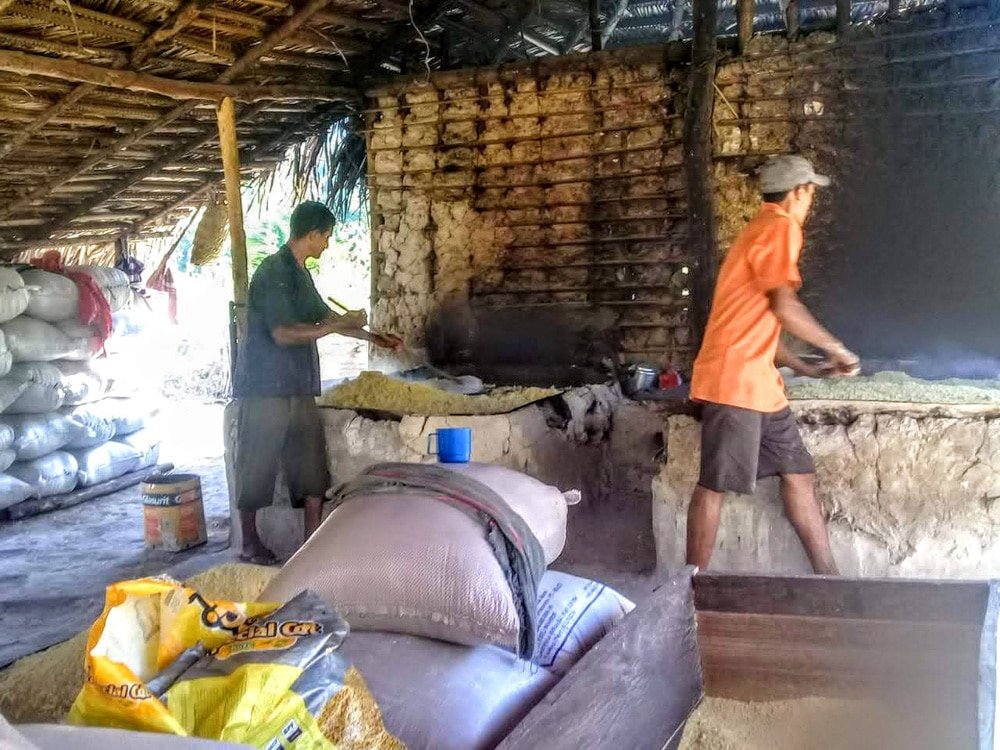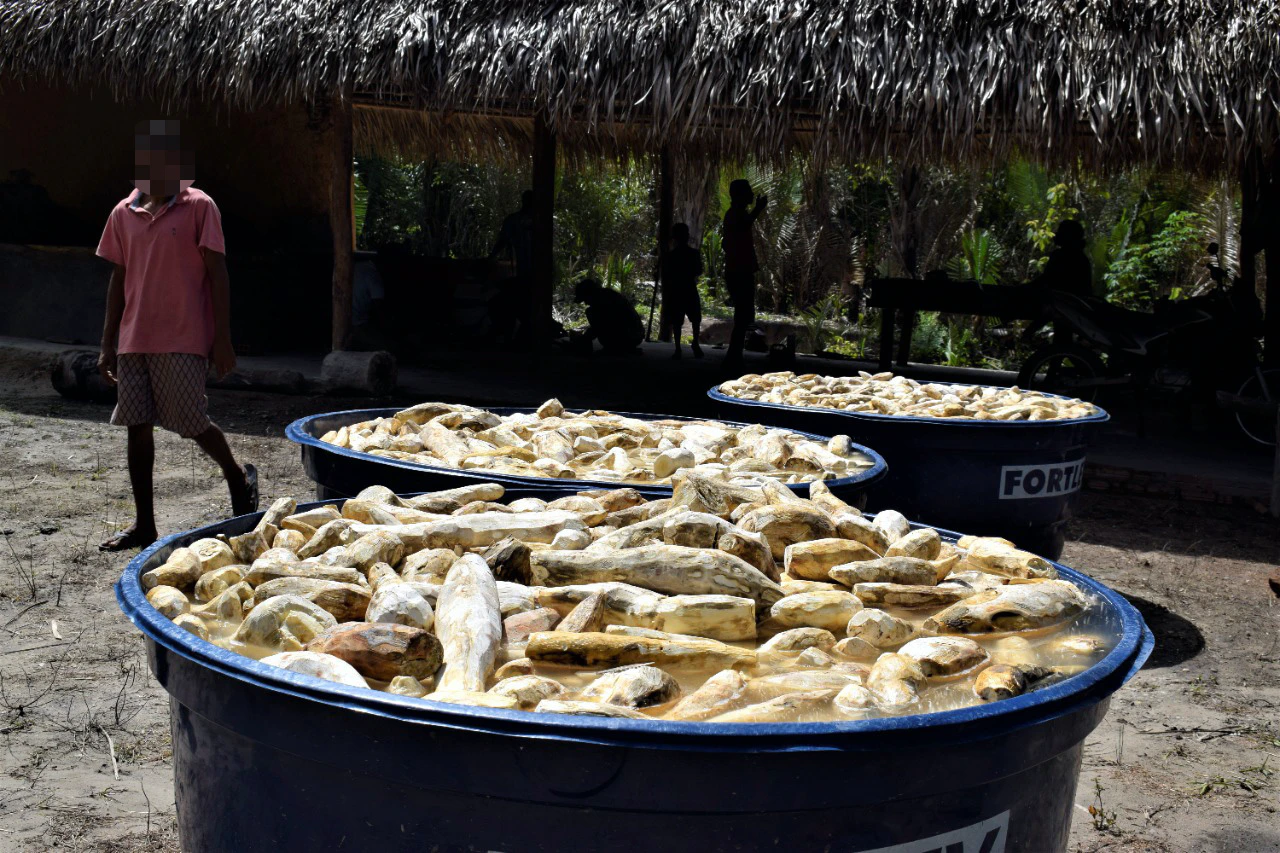Maranhão State
CERRADO AND AMAZON REGIONS
The Jaqueira territory is located in the Cocais region, in the municipality of Timbiras, Maranhão state, and it embraces the communities of Santa Maria, Jaqueira, Arrendamento, Cavalo Morto, Pastorinha, Mororó, and São Tomé. Covering more than 4,300 hectares, the territory is located between the Cerrado and Amazon regions and has been home to about 400 families for at least 70 years. These are traditional peasant communities, babassu coconut breakers, traditional extractivist[1], and riverside communities who share the land are organized in peasant movements and extractivist women’s collectives.
The families of the Jaqueira have a historical relationship with their territory, which has long been occupied by their ancestors, and are organized in its defense. In the municipality of Timbiras, there are hundreds of centuries-old traditional communities that have been constantly threatened by the encroachment of the agricultural frontier since the 1980s, a situation that has recently worsened by the approval of government incentives for the agricultural region known as Matopiba.[2]
One of the most violent cases occurring in Timbiras – and in Maranhão state – is related to an agribusiness empire. The Maratá group is known in the region for producing over 150 products, including food products and tobacco. This company, which started out in Sergipe state, currently exports fruit beverages to Europe, in addition to having interests in the civil construction sector. The first reports of violence date back to 2004, when the company’s henchmen evicted families from the land, burning their homes in the process. In an act of resistance, the families took back their territory, reestablishing their ancestral relationship with the land, its waters and forests.
More recently, however, an extremely violent action brought despair to the Jaqueira and Santa Maria communities and resulted in new expropriations. Henchmen who spent months threatening the families imposed an end of July deadline for the community to leave the territory, for better or for worse.
The first attack in 2004 toppled some of our houses and set others on fire. Some relocated to the outskirts of the cities, others traveled, but everywhere we go we are enslaved; there’s nothing like the peace derived from producing one’s own food. We took back the land, we lay low for a while. Then in 2019 one of the henchmen began to tell us that we couldn’t transit there because the land belonged to Maratá, and that they wanted the land back. We said we did not recognize Maratá as the owner, that we had lived in that land for a long time”, testimony of a peasant (identity withheld for protection)
Notes
About the Matopiba region, see the article “Dangerous liaisons: international pension funds, fires and land grabbing in Matopiba”.
The violent situation continued for another day, resulting in more gunfire and criminal fires. When the military police finally arrived the henchmen abandoned their motorcycles, but not without firing shots towards the police and the families, who were hiding in the woods. The fact that the expropriation was carried out by corporate henchmen demonstrated that the company does not have legitimate ownership of the land. Otherwise, the company would claim for the land via a repossession proceeding in the Court.
The dispossession hit the families hard, and having lost their crops, more than 300 sacks of cassava flour, and their homes, they came to depend on charity to survive. After having received direct threats, including shots fired into the air, resident Egino Santos de Brito fell ill and was hospitalized, dying of a heart attack a few days later. Maria Oletti, another peasant farmer, had a stroke after witnessing that hundreds of kilos of babassu coconut she had gathered were burned. She was left with memory loss and a partially paralyzed face. Her brother had already been evicted from the territory in the 2004 episode, with fire and violence. There are also reports from families thrown out in 2019 who were subject to the violence inflicted during the previous decade and, traumatized, had no longer the heart to return to the territory.
In October 2019, an action was launched by the civil police in partnership with the military police in the municipalities of Coroatá and Timbiras. At the Vai com Deus farm, owned by the Maratá group, several weapons were seized, such as shotguns, as well as large quantities of ammunition. There was a 40 caliber pistol, whose use is restricted to police forces. Four men were arrested, three of whom had participated in the August ejection of the families from the Jaqueira territory. One of them was the farm manager Seulys Lima Franco, released by the police a few weeks later and then fired for cause by the company. In this operation, a motorcycle registered in the name of the owner of the Maratá company, José Augusto Vieira, was also seized.
In April 2021, the State’s District Attorney’s Office filed a complaint against the henchman for the crimes that took place in 2019, but never held the company accountable. In May, the authorities filed a case in the court of the district of Timbiras, still underway.
There are also two civil lawsuits filed by the lawyer who advises the community: one with the Timbiras jurisdiction, remitted to the Agricultural Court in São Luís, for maintenance of possession, and another one for damages. The families intend to file four more lawsuits for damages against the company.
The land that the Maratá group claims as its own is inside the Data São Raimundo area, a former latifundium of 4,356 hectares. In 2020, courts recognized farmer José Thomé as the rightful owner of the area dating back to the 1970s. He had filed a suit against the group in 2005. This decision reaffirms the process of land grabbing by the Maratá group. Part of the latifundium, however, has been occupied at least since the 1950s by some communities, such as Santa Maria and Jaqueira. These communities are struggling to have their tenure rights recognized.
The expansion of the agricultural frontier amplifies threats, but traditional families resist
In the region, the land market is heated. Traveling along the roads that lead to the territories of the communities, one can witness fences being built and rebuilt, as well as large forest areas of the Cerrado region that have been cleared. In a recent meeting[3], the mayor of the municipality claimed, without presenting any documentation, that in 2021 alone, 26 areas were sold to groups of farmers from the states of Ceará, Pernambuco, Alagoas, and Sergipe. This led to the eviction of families in the middle of the pandemic. For rural peasants, COVID-19 fears were compounded by the terror tactics employed by agribusiness enterprises, such as physical violence, fire, poisoning by pesticides, and deforestation, used to push the families out of their territories.
The traditional communities of Timbiras are not being consulted or heard about these recent ventures, as well as about the processes resulting in new licenses issued in favor of ranchers for deforestation. Thus, the government of the state of Maranhão and its State Secretariat for the Environment and Natural Resources (Secretaria Estadual de Meio Ambiente e Recursos Naturais, Sema), as well as local governments, are in violation of convention 169 of the International Labor Organization (ILO), of which Brazil is a signatory country, and which grants the communities the right to free, prior, and informed consultations.
Notes
Historically, peoples originating from the Timbiras region often end up enslaved in other parts of the country. Since the 2000s, the extreme poverty to which many families are exposed, largely motivated by the processes of land grabbing and land concentration, have led them to forced migration. In some communities, people have left the area to find jobs to supplement the income from working on the land.
This is what happened to some of the families pushed out by the Maratá group. Shaken by previous episodes, with no support from public bodies, they have endured times of hunger, hopelessness, episodes of depression among their women, and so many other painful events. Faced with the loss of food autonomy, peasants left in search of work to regions controlled by the agribusiness, in the southeast, north and center-west regions of Brazil, leaving wives, daughters, and sons under the care of relatives. Neither the threatened communities nor their leaders were placed in protection programs, despite the widespread publicity of the case on social media networks and national media.[4]
In December 2020, however, following the arrest of the farm manager, 40 peasant families began to retake possession of the territory. A year later, despite having been ignored by municipal authorities, the families have already found hope: there is now food on their tables, harvested from their own fields, as well as new housing and casas de farinha [flour milling houses]. Families are producing and protecting the forest, waters and springs in the process. Their collective work is being strengthened, as well as the community’s spiritual traditions, health, and the safe keeping of native seeds. The families resist by cultivating rice, cassava, beans, sweet potatoes, macaxeira, legumes, and fruit, and by extracting the nut from the babassu in order to produce oil and soap.

Fotografia: CPT Jaqueira – Roças na área retomada começam a produzir 1
Notes
Investigative report “Café com pólvora” [“Coffee with gunpowder”], Intercept (May/2021), had widespread impact and negative repercussions for the company.
The women of the community are organizing themselves in a network of peasant women involved in agrarian conflicts in the municipality of Timbiras. There are approximately 20 women within the community who are babassu coconut breakers and farmers, who are organizing their coexistence, celebrating their resistance, promoting education campaigns for the continuing care of the territory and its life. These women bring different experiences to the group: some have been to the southeast region of Brazil to work as sugarcane cutters, while others have never left the territory.
They swapped experiences in agroforestry and exchanged views about resistance processes.
Thus, now organized and producing, the community will remain in its territory.
Comissão Pastoral da Terra [Pastoral Land Commission] of Maranhão State







